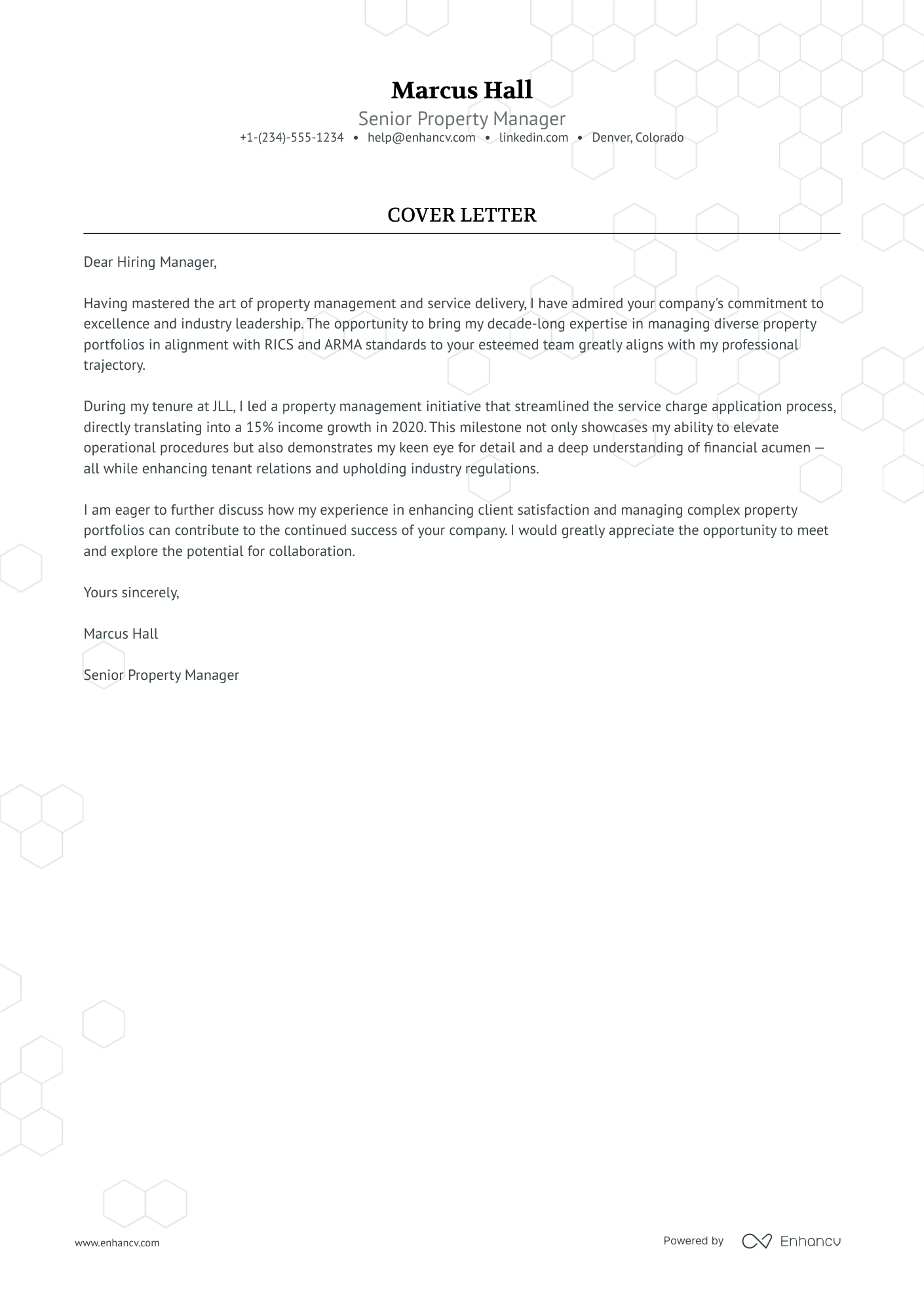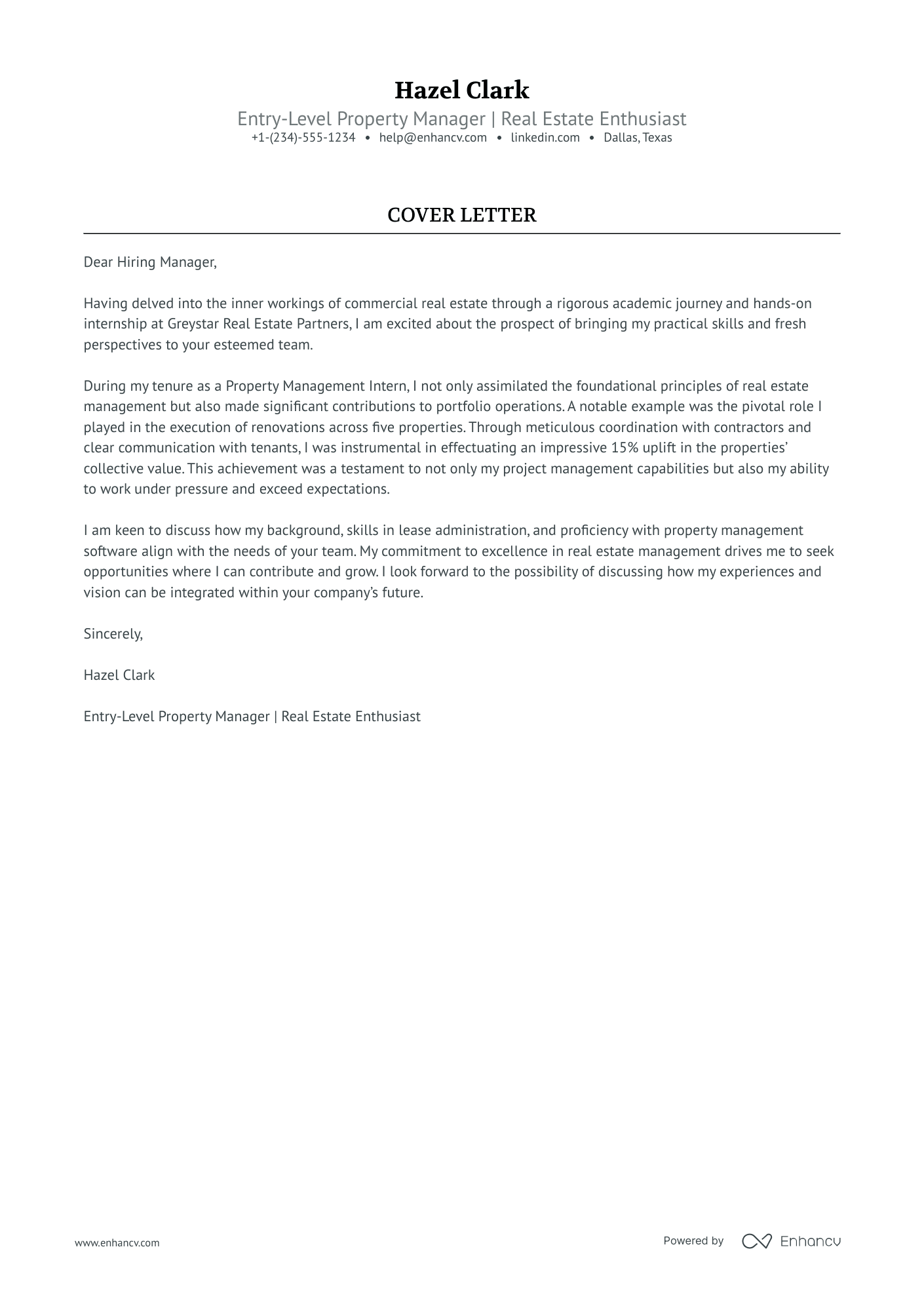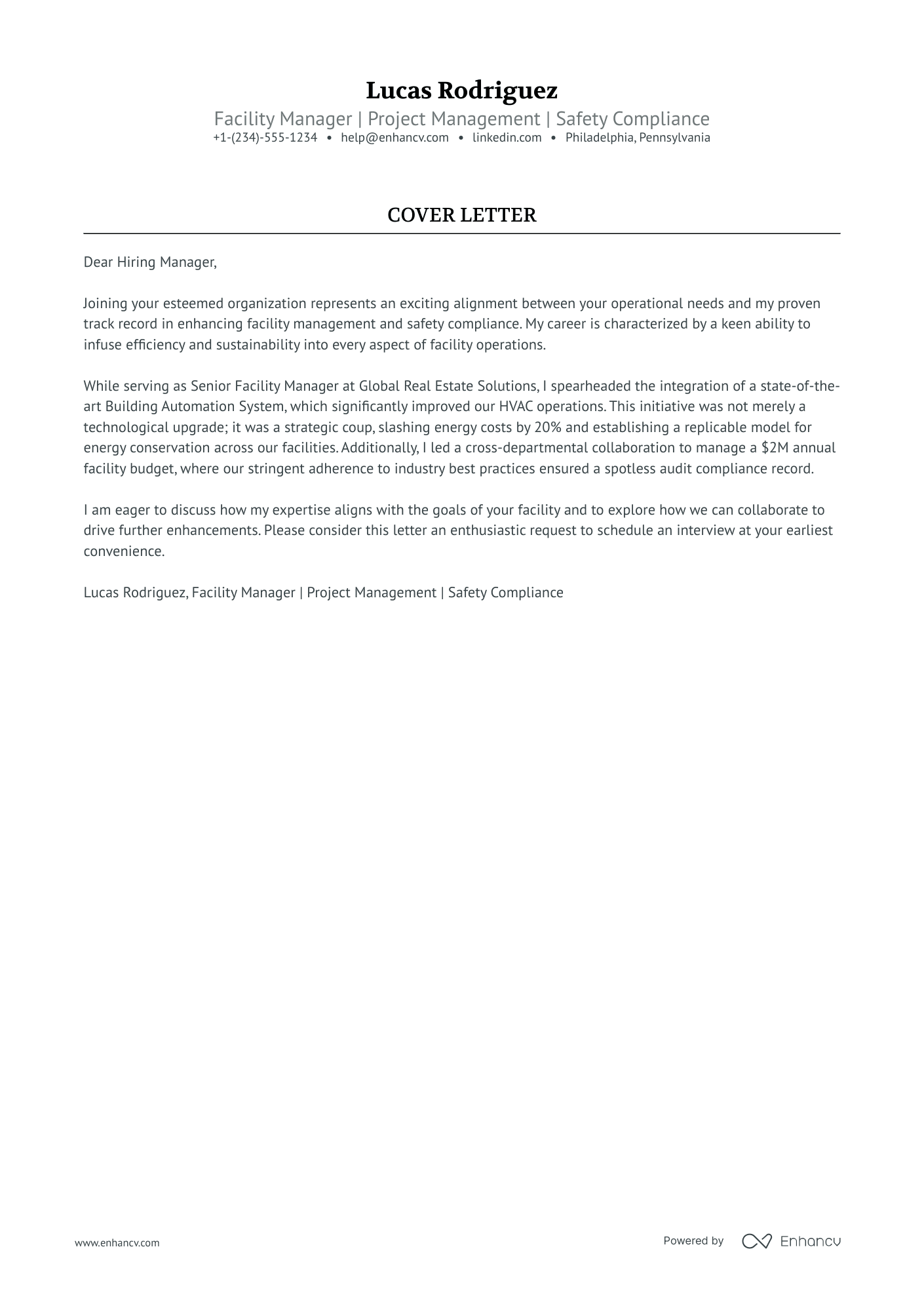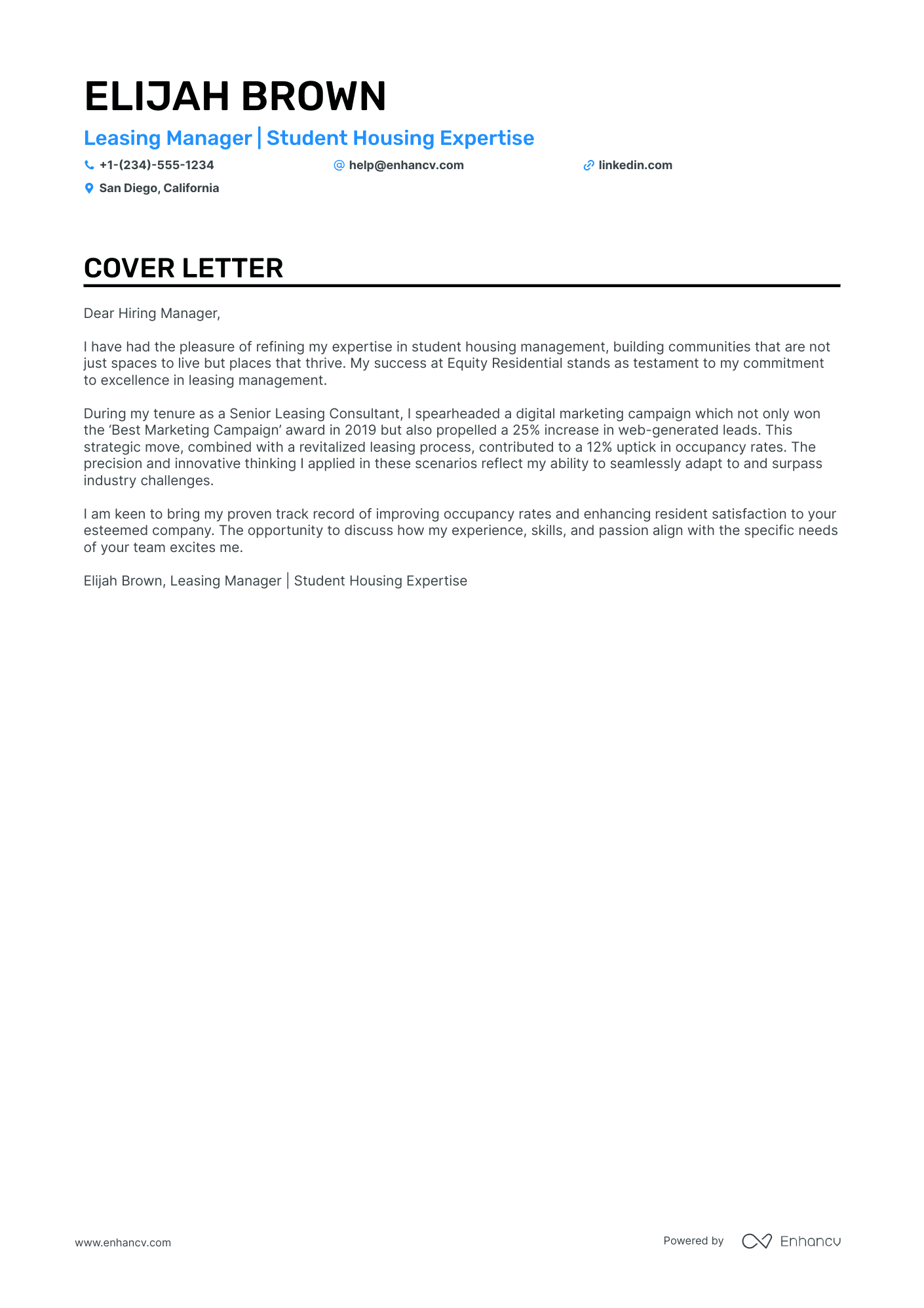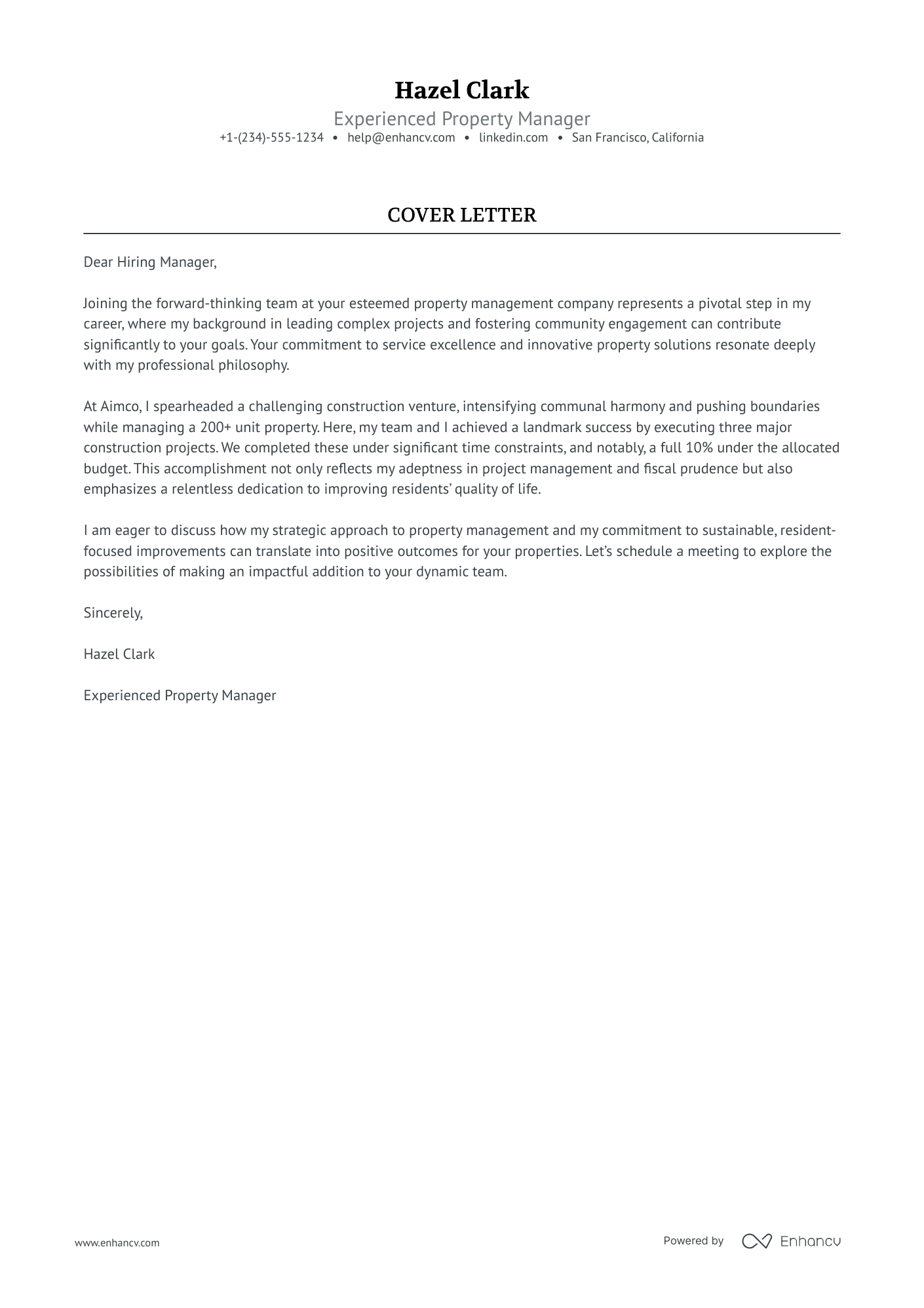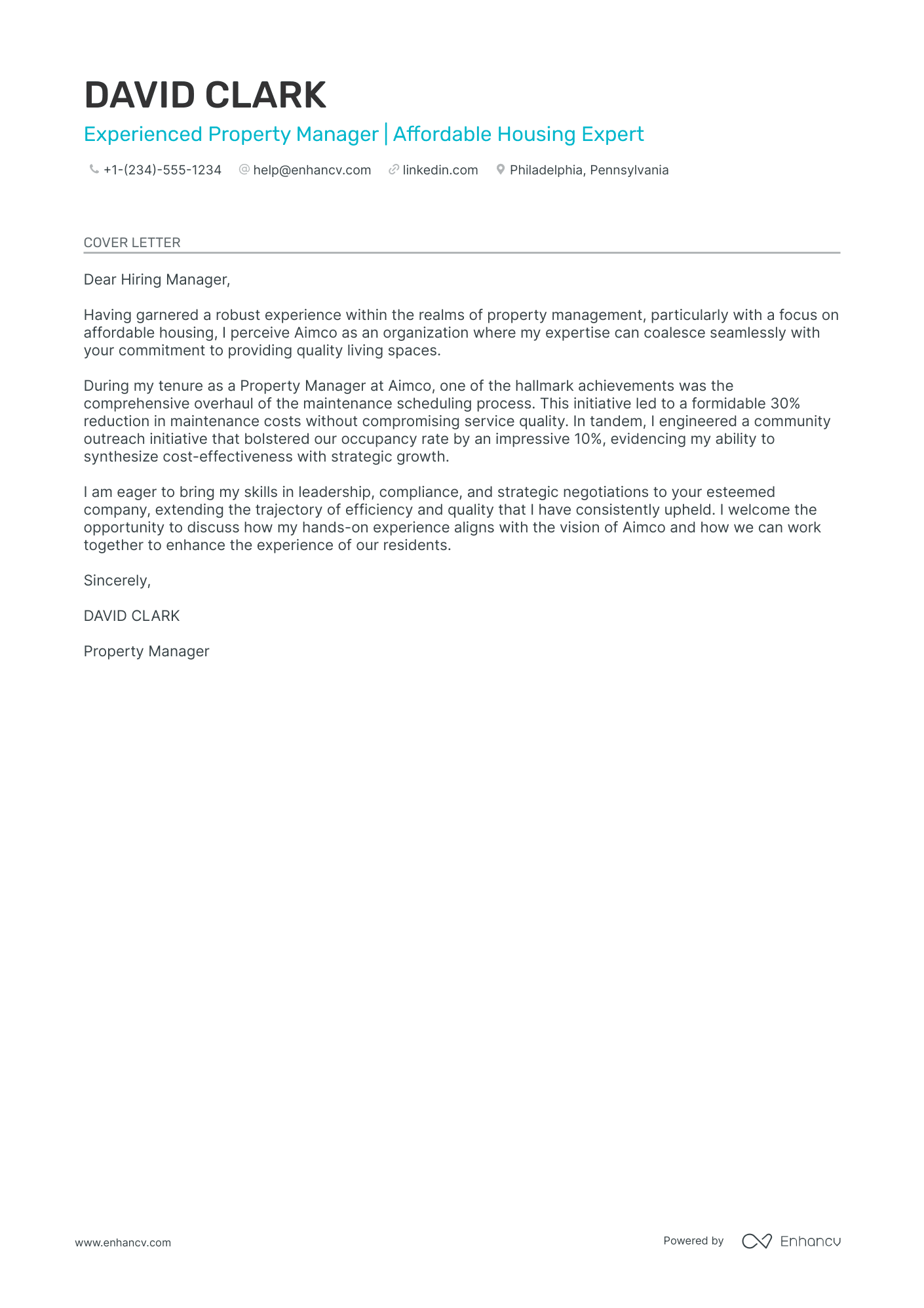Embarking on your job hunt, you've likely encountered the need for a standout property manager cover letter. Crafting this essential document might seem daunting, particularly when figuring out how to share your achievements without echoing your resume. The key is to weave your proudest professional moment into a compelling narrative, dodging tired clichés and maintaining a formal tone. With the right approach, your one-page letter will not only introduce you but also tell the story of your success.
- Writing the essential property manager cover letter sections: balancing your professionalism and personality;
- Mixing storytelling, your unique skill set, and your greatest achievement;
- Providing relevant (and interesting) information with your property manager cover letter, despite your lack of professional experience;
- Finding the perfect format for your[ property manager cover letter, using templates from industry experts.
Leverage the power of Enhancv's AI: upload your resume and our platform will map out how your property manager cover letter should look, in mere moments.
If the property manager isn't exactly the one you're looking for we have a plethora of cover letter examples for jobs like this one:
- Property Manager resume guide and example
- House Manager cover letter example
- Realtor cover letter example
- Estate Agent cover letter example
- Mortgage Broker cover letter example
- Real Estate Manager cover letter example
- Assistant Property Manager cover letter example
- Real Estate Sales Manager cover letter example
- Real Estate Broker cover letter example
- Real Estate Professional cover letter example
- Real Estate Developer cover letter example
Drop your resume here or choose a file.
PDF & DOCX only. Max 2MB file size.
Property manager cover letter example
Taylor Foster
Herndon, MD
+1-(234)-555-1234
help@enhancv.com
- Highlighting significant career achievements, such as managing a high-value portfolio sale, showcases the ability to handle high-stakes transactions and underscores a proven track record of success.
- Emphasizing customization in service ("Tailoring my approach to each client’s situation") demonstrates an understanding that real estate is a client-driven business and that the candidate is adaptable and client-focused.
- Specific mention of sales figures ($13M in sales) provides quantifiable evidence of the candidate’s performance, which can be persuasive to potential employers looking for competence in business development and sales proficiency.
- Mentioning readiness for an interview signals proactiveness and eagerness to engage with the potential employer, indicating a serious interest in the role.
Five tips on formatting your property manager cover letter
Do you want to make a good impression on recruiters and, at the same time, follow the best industry advice on writing your property manager cover letter?
Make sure to include the following:
- Header and Salutation;
- Introductory paragraph;
- Body paragraph;
- Closing paragraph;
- Signature (this one is up to you).
Remember to use the same modern, simple font for your property manager cover letter as you did for your resume (e.g. Lato, Rubik, etc.)
Ensure your property manager cover letter is single-spaced and is wrapped around a one-inch margin, like in our cover letter templates.
Once completed, use our cover letter builder to export your property manager cover letter in the best format to keep your information intact - PDF.
At the end of the day, your property manager cover letter won't be assessed by the Applicant Tracker System (ATS) software, but by the recruiters. Your information should thus be legible, organized, and follow a structured logic.
Let us save you time! With our free cover letter generator, you can create a professional letter instantly using your resume.
The top sections on a property manager cover letter
- Header: Includes your contact information, the date, and the employer's details, ensuring that your cover letter appears professional and providing a simple way for the recruiter to identify and contact you.
- Greeting: Addresses the recruiter or hiring manager directly by name if known, which shows that you've done your research and are serious about the particular property management position.
- Introduction: Captures the attention of the recruiter by briefly stating your background in property management, indicating the role you're applying for, and expressing your enthusiasm for the position, establishing a personal connection from the start.
- Body: Highlights your specific property management skills, experiences, and achievements, including tenant relations, maintenance oversight, lease negotiation, and any relevant certifications, directly correlating your qualifications to the job requirements.
- Closing: Reiterates your interest in the role and invites further discussion, leaving the recruiter with a call-to-action to follow up with you for an interview, along with a polite sign-off.
Key qualities recruiters search for in a candidate’s cover letter
- Proven experience in property management: Demonstrates hands-on knowledge in managing residential or commercial properties, which is critical to effectively oversee operations, tenant relations, and building maintenance.
- Excellent organizational skills: Necessary to manage multiple tasks efficiently, including lease administration, contractor coordination, and facility management to ensure smooth property operations.
- Strong communication and interpersonal skills: Vital for interacting with tenants, owners, vendors, and staff to resolve issues, negotiate leases, and maintain positive relationships.
- Familiarity with property law and regulations: Important for ensuring compliance with local, state, and federal housing laws and regulations, and to protect the property owner's interests.
- Proficiency in financial management: Required to manage budgets, reduce costs, and increase profitability through rent collection, financial reporting, and expense control.
- Leadership and team management capabilities: Essential for directing on-site employees, fostering teamwork, and implementing policies to maintain high-quality property standards.
What greeting should you use in your property manager cover letter salutation
A simple "Hello" or "Hey" just won't work.
With your property manager cover letter salutation, you set the tone of the whole communication.
You should thus address the hiring managers by using their first (or last name) in your greeting.
But how do you find out who's recruiting for the role?
The easiest way is to look up the role on LinkedIn or the corporate website.
Alternatively, you could also contact the organization via social media or email, for more information.
Unable to still obtain the recruiter's name?
Don't go down the "To whom it may concern path". Instead, start your cover letter with a "Dear HR team".
List of salutations you can use
- Dear Hiring Manager,
- Dear [Company Name] Team,
- Dear [Hiring Manager's Name],
- Dear [Mr./Ms./Dr./Prof. Last Name],
- Dear [Department Name] Search Committee,
- Dear [Job Title] Hiring Committee,
What to include in those first two sentences, or your property manager cover letter introduction
Have you ever wondered what the best way is to present your profile in the property manager cover letter introduction?
There's no right or wrong answer if you're being concise and authentic to yourself.
Some professionals start their property manager cover letter by:
- congratulating the company - focusing on something impressive, whether that's an award, an industry-leading project, or a key event;
- aligning their passion for the field or industry with the job - if you're enthusiastic about what you do, you'd thus grow your skill set and value as a professional.
Choosing your best achievement for the middle or body of your property manager cover letter
Now that you have the recruiters' attention, it's time to write the chunkiest bit of your property manager cover letter.
The body consists of three to six paragraphs that focus on one of your achievements.
Use your past success to tell a story of how you obtained your most job-crucial skills and know-how (make sure to back these up with tangible metrics).
Another excellent idea for your property manager cover letter's middle paragraphs is to shine a light on your unique professional value.
Write consistently and make sure to present information that is relevant to the role.
Two ideas on how to end the final paragraph of your property manager cover letter
Closing your property manager cover letter, you want to leave a memorable impression on recruiters, that you're a responsible professional.
End your cover letter with how you envision your growth, as part of the company. Make realistic promises on what you plan to achieve, potentially, in the next six months to a year.
Before your signature, you could also signal hiring managers that you're available for the next steps. Or, a follow-up call, during which you could further clarify your experience or professional value.
Is it beneficial to mention that you have no experience in your property manager cover letter?
Lacking professional experience isn't the end of the world for your property manager cover letter.
Just be honest that you may not have had roles in the industry, but bring about so much more.
Like, your transferable skills, attained thanks to your whole work and life experience (e.g. the skills your summer spent working abroad taught you).
Or, focus on what makes you, you, and that one past success that can help you stand out and impress recruiters (think of awards you've attained and how they've helped you become a better professional).
Alternatively, write about your passion and drive to land the job and the unique skill set you would bring to enhance the workplace culture.
Key takeaways
Creating your property manager cover letter should be a personalized experience for the role and the recruiter, where you:
- Format your cover letter using the same ATS-friendly font (e.g. Railway) as you did for your resume;
- Greet recruiters, using their name, and follow up with two sentences to introduce yourself, your interest in the role, and to stand out;
- Map out one key success from your career (or life) that has taught you job-crucial skills;
- Substitute your lack of experience with an achievement from your internships, degrees, or volunteering gigs;
- End with a promise for your potential or your availability for an interview.
Property Manager cover letter examples
By Experience
Senior Property Manager
Entry-Level Property Manager
By Role
